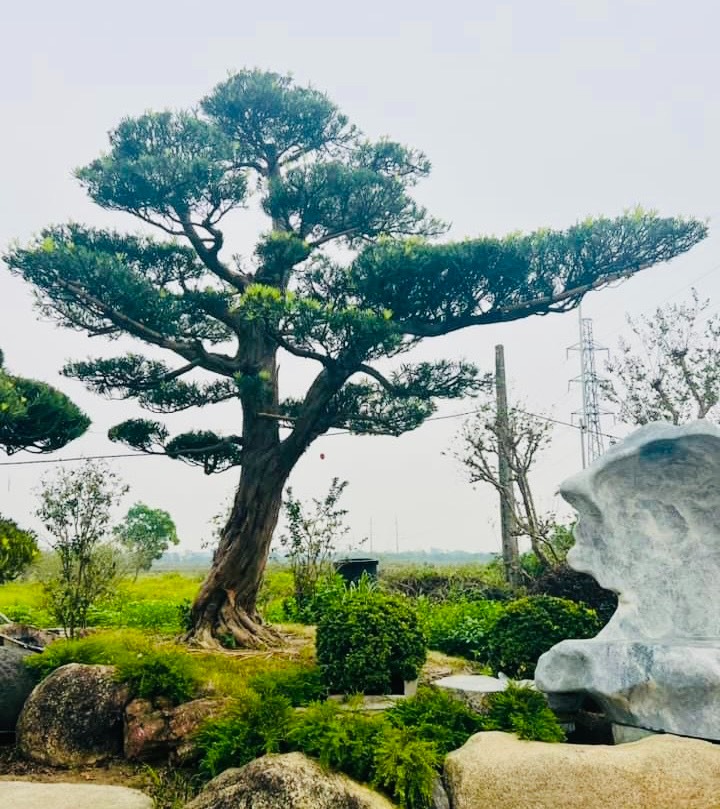1. What is Podocarpus Macrophylllus?
Podocarpus Macrophylllus is a large, rugged tree with rough dark bark. Branches multi-branched, horizontal or drooping. If grown naturally, Podocarpus Macrophylllus can grow to more than 10m tall.
Podocarpus Macrophylllus leaves are narrow, long, coniferous, with short petioles, hard and glossy green leaves, spirally spaced. With the advantage of durable leaves, little shedding and green all year round.
The flowers of Podocarpus Macrophylllus are spike-shaped with milky white threads. The flower of the female plant has a large calyx, underneath there are four glandular scales. Flowers bloom in May.
Round blue fruit. The fruit is shaped like an Arhat statue, so people call this tree Podocarpus Macrophylllus. The seeds of the tree are used to grow seedlings, grow beautiful and luxurious interior ornamental plants.
The Podocarpus Macrophylllus tree grows in arid, high-altitude mountainous areas with sustainable vitality. The life span of the tree is very long. Can grow in harsh soils, withstand storms, wind and dew.
In the past, Podocarpus Macrophylllus was very rare, today the hobby of ornamental plants is replicated, so it is known by many people. Trees are of great value, with trees up to billions of dollars.

Podocarpus Macrophylllus with many meanings is loved and planted in cultural works such as temples, courtyards, villas, parks, miniatures, relic sites, resorts, restaurants .... Just planted with grass in the background. Podocarpus Macrophylllus still reveals its majestic and luxurious position.
With the green leaves of the four seasons, full of vitality, the luxurious and elegant tree shape brings a noble and strong demeanor. Podocarpus Macrophylllus is very suitable when displayed in halls, commercial areas, places with large spaces. When the tree is decorated with ornamental stone blocks, it will create a more elegant and poetic scene. Even after hundreds of years, the tree still retains its style and shape.
In the art of bonsai, Podocarpus Macrophylllus also holds a unique position with super products of humanistic value and attractive beauty. The branches are very flexible and malleable, so under the talented hands of the artisans, the delicate beauty of the bonsai tree is multiplied.
2. Feng Shui Meaning
The ancients believed that Podocarpus Macrophylllus was a tree with aura, capable of blocking poisonous winds, and exorcising evil spirits. So, whoever owns Podocarpus Macrophylllus is like having an amulet. Protect yourself and your family from harmful influences, bring peace and good luck to the whole family. The fruit of this tree looks like an arhat statue. He is the patron saint of peace. Therefore, the tree Podocarpus Macrophylllus is considered a living buddha. Means protection for the owner and brings peace to the family.
In feng shui, the most well-known is the prosperity and prosperity that this plant can bring to the owner. The tree has a durable vitality, withstands all the effects of harsh weather, is always green, shines. They symbolize constant growth, overcoming all adversities, bringing prosperity to life
3. How to take care of plants
- Light: Podocarpus Macrophylllus tolerates a large light amplitude, the plant likes strong light but can still live in a shaded environment. However, when living in a low light environment for a long time, the tree branches are weak, the branches are stretched, the distance between the branches is sparse, so the overall tree is not beautiful and lacks vitality.
- Watering: Podocarpus Macrophylllus loves water but is poorly tolerant of waterlogging, so care should be taken when watering. Symptoms of waterlogged plants are yellow leaves and gradual death. It is recommended to regularly spray water on the leaf surface to wash away dirt, enhance photosynthesis, and keep the leaves green and beautiful.
- Fertilizer: Podocarpus Macrophylllus loves fertilizers, so it is recommended to apply several times, each time a small amount, mainly nitrogen fertilizer, but for the ornamental pots that have been shaped, it is not recommended to fertilize more. sensitive to fertilizers. Need to pay attention to watering the tree to have many branches.
- Common pests and diseases: Podocarpus Macrophylllus often encounters a number of diseases: hard bark beetle, leaf spot, red mealybug, red spider disease. Pay attention to observing to detect diseases, especially in summer.
The root and trunk grow slowly, so it is necessary to pay attention to pruning, cutting leaves on the canopy so that the tree has enough nutrients to nourish the trunk.


















